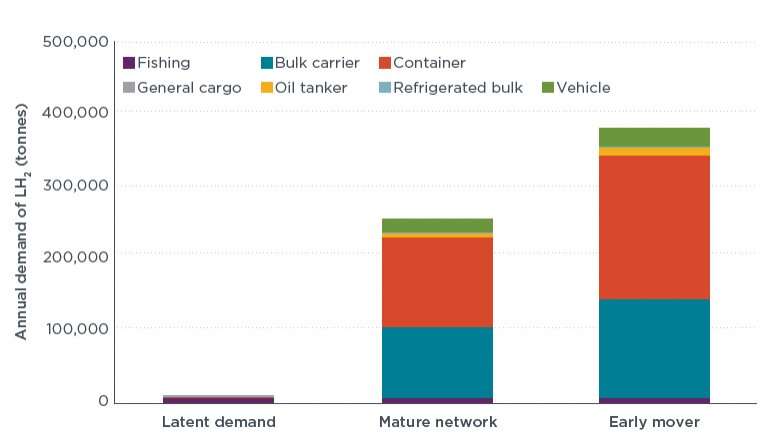Potential market for liquid hydrogen as a marine fuel in the Aleutian Islands

As interest grows in the potential of using "green" hydrogen generated from renewable electricity to help decarbonize maritime shipping, a new study from the International Council on Clean Transportation (ICCT) estimates there could be substantial demand for liquid hydrogen (LH2) at the Aleutian Islands ports in Alaska, including 10,000 tons annually from ships that already call on Dutch Harbor.
The introduction of hydrogen-powered ships is likely to happen in stages, and meeting the 10,000 tons of latent demand, about 77% of it from local fishing vessels, might stimulate a market for LH2 that could later be expanded to oceangoing vessels. Indeed, the study finds that in a future scenario where additional oceangoing vessels divert to Alaska to refuel as part of a mature transpacific hydrogen network, the annual demand at the Aleutian Islands could be up to 260,000 tons of LH2. That is a market value of more than $1 billion, assuming 2035 LH2 prices. An even larger potential market of up to $1.6 billion could potentially be captured if Alaska is an early mover and makes proactive investments in LH2 bunkering infrastructure to lock in customers.
"Our research highlights that Alaska has both potential supply of and demand for renewable marine fuels," said Elise Georgeff, associate researcher at ICCT and the study's lead author. "Building a market for hydrogen at Aleutian Islands ports could reduce pollution, spur local economic development, and help local Indigenous communities reduce their dependence on fossil fuels," she added.
The study also finds that most current models are underestimating energy use from fishing vessels by about one-quarter because they neglect substantial hydraulic and refrigeration loads. Further, fishing fuel use is bimodal: Though propulsion demands most of the energy on transit voyages, energy use for hydraulics and refrigeration is essential during and after active fishing. This improved understanding could be of help to those designing future zero-emission fishing vessels and engines.
"There is a strong case here for U.S. federal funding to help jumpstart hydrogen bunkering at Aleutian ports, as it would leverage their favorable geography, significant latent demand, and untapped renewable energy potential," said Marine Program Director Dan Rutherford.
The Bipartisan Infrastructure Law passed by the United States in 2021 included $2.25 billion for port infrastructure. "Supporting liquid hydrogen in the Aleutians is a unique opportunity to decarbonize shipping in the United States," Rutherford said.
More information: Report: theicct.org/publication/marine … ians-hydrogen-jun22/


















